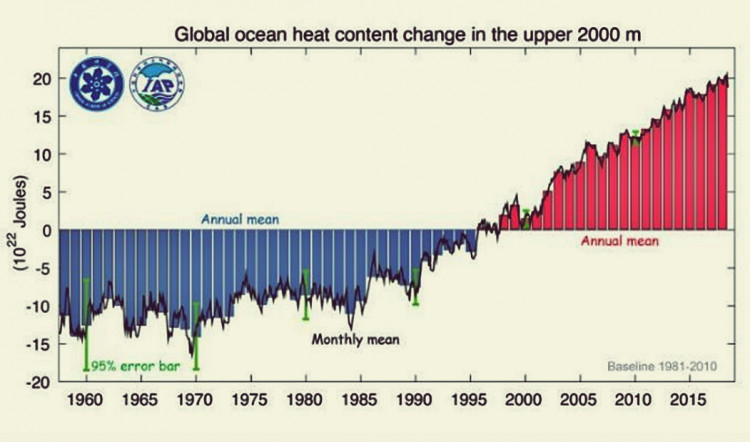Another year, another unwanted record for our steadily warming climate. A new study has identified 2018 as the hottest for the Earth's oceans since global records began in 1958.
And 2019 promises to be even worse.
The study by an international team of scientists published in the scientific journal, Advances in Atmospheric Sciences, reveals that 2018 easily surpassed the previous hottest year, which was 2017. It says the top five years of this unrelenting ocean heat have occurred in the last five years (2014 to 2018).
The study confirms the trend of global ocean warming is a direct result of the warming of the planet by humans, which is also called anthropomorphic climate change.
More alarmingly, the study confirms that oceans are warming faster than anticipated, and are absorbing more heat than previously estimated. These factors together will result in a six-fold increase in ocean warming from 2081 to 2100 compared to the past 60 years.
Warmer oceans spell bad news for life on our planet. The rising amount of heat-trapping greenhouse gases such as carbon dioxide and methane released into the atmosphere by humans worsens the already skewed energy imbalance that leads to global warming.
Warmer oceans trigger a range of unwelcome problems such as sea level rise and deadlier and more powerful typhoons and hurricanes. It also triggers coral bleaching and accelerates the ice melt at the Arctic and Antarctic.
The vast majority of global warming heat ends up deposited in the world's oceans, said the study. Previous studies show that more than 90% of the heat trapped by greenhouse gases is absorbed by the oceans
Increases in ocean heat are irrefutable proof that the Earth is warming, said the study. According to the study, ocean heat trend is a better climate change indicator compared to air temperature.
The impacts from warming oceans were clearly visible during 2018, according to the study.
The heat added to the oceans resulted in a global mean sea level rise of 29.5 millimeters above the 1981 to 2010 average -- which was the largest ever recorded. Warmer water fueled major hurricanes and typhoons across the world in 2018.
These storms included Super Typhoon Mangkhut, the strongest storm of the year, which caused major damage to the Philippines and Hong Kong.
The global mean surface temperature record is greatly affected by weather, and El Nino among others, said Kevin Trenberth, co-author of the study and a scientist with the Climate Analysis Section at the U.S. National Center for Atmospheric Research.






